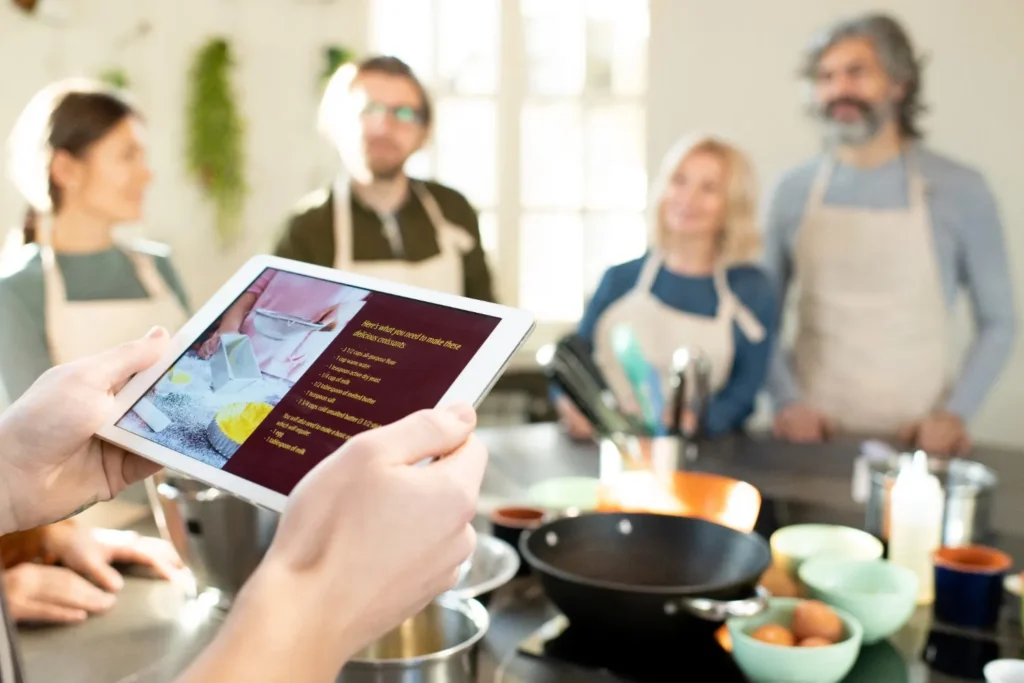Cloud Kitchen in India: India’s food business is booming, and cloud kitchens are becoming a high-return business prospect. With very little overhead, the freedom to operate from anywhere, and scalability, cloud kitchens are fast becoming the preferred choice among aspiring business owners.
However, starting a cloud kitchen requires careful planning and a substantial investment. In this article, we will dive into the key areas of investment and budgeting to help you launch your successful cloud kitchen in India.
Table of Contents
1. Kitchen Equipment: Hospitality and Food Sector in Lucknow

Essential Equipment:
- Commercial-grade stoves and ovens
- Refrigeration units (refrigerators, Deep freezers)
- Exhaust hoods and ventilation systems
- Deep fryers
- Grills and toasters
- Food processors and mixers
- Combi Ovens
- HVAC and Fire Suppression System
- Approximate Budget: INR 500,000 – 20,00,000
2. Smallwares and Kitchen Tools: Modern Commercial Kitchens In Lucknow

Tools That Are Must-Haves:
- Pots, pans, and utensils
- Baking trays and sheets
- Tongs, spatulas, and ladles
- Measuring cups and spoons
- Strainers and sieves
- Whisks and beaters
- Approximate Budget: INR 200,000 – 400,000
3. Staff Uniforms: Cloud Kitchen in India
Uniforms That Are Must-Haves:
- Chef coats and pants
- Aprons
- Hats or hair nets
- Non-slip shoes
- Approximate Budget: INR 20,000 – 70,000
- cloud kitchen Packaging material by Horeca stop
4. Packaging Material: Cloud Kitchen in India
Packaging That Is Must-Have: Pesonalized Kitchen Space-Saving Solutions in Lucknow
- Food-grade containers
- Bags and boxes
- Labels and stickers
- Packaging tape
- Approximate Budget: INR 50,000 – 300,000
5. Marketing Budget: Cloud Kitchen in India
Marketing Channels That Are Must-Haves:
- Online food ordering websites (Swiggy, Zomato, Uber Eats)
- Social media marketing
- Email marketing
- Content marketing (blogging, vlogging)
- Search engine optimization (SEO)
- Pay-per-click (PPC) advertising
- Approximate Budget: INR 20,000 – 100,000 per month
Additional Considerations: Cloud Kitchen in Lucknow
- Kitchen Rental: The rental cost of a commercial kitchen space can be quite high based on the location and size of the kitchen.
- Licenses and Permits: Acquisition of required licenses and permits, like FSSAI license, GST registration, and fire safety clearance, may involve additional expenses.
- Legal and Professional Fees: Hiring legal and accounting experts will assist you in dealing with the intricacies of business setup.
- Inventory Costs: The amount you invest in food inventory and packaging will be determined by your menu and the size of your operation.
- Technology and Software: Spending money on quality point-of-sale (POS) systems and food delivery management software can automate processes.
The huge investment range in each category differs based on the size, idea, and number of brands you want to begin with, Much cost also depends upon the type of automation you want to introduce, For instance, a Good Combi oven from Rational, Unox or Convotherm begins at INR 5 Lakh, Which is a huge investment. So Plan your investment in accordance with the target market and ROI.
Conclusion: Cloud Kitchen in Lucknow
Although the initial investment to open a cloud kitchen in India can be high, the potential profits can be huge. By carefully organizing your budget and paying attention to quality food, efficient operations, and effective promotions, you can start a successful cloud kitchen business.
For more readings refer Blogs
Frequently Asked Questions: Affordable Commercial Kitchen Design for Hotels
1. What is the cost of investment for opening a cloud kitchen in India?
The initial investment in an Indian cloud kitchen generally ranges between ₹15 and ₹20 lakhs. This is inclusive of costs for kitchen appliances, rental space, licenses, salaries of the staff, and initial stock.
2. Can I open a cloud kitchen from home?
Yes, it is possible to start a cloud kitchen from home, as long as you follow local health and safety laws. You will have to get the required licenses and make your kitchen commercial-grade.
3. What are the licenses needed to run a cloud kitchen?
To run a cloud kitchen legally in India, you require:
Food Safety and Standards Authority of India (FSSAI) license
Goods and Services Tax (GST) registration
Trade license from local municipal authority
Fire safety clearance
Registration under Shops and Establishment Act
4. How profitable is a cloud kitchen business?
Profitability depends on the location, menu, and operational efficiency. A well-run cloud kitchen can post net profit margins of 10-15% in the first year.
5. What are the recurring monthly costs of a cloud kitchen?
Monthly costs usually are:
Rent: ₹50,000 – ₹1,00,000
Staff salaries: ₹80,000 – ₹1,50,000
Inventory and raw material: ₹1,00,000 – ₹1,50,000
Utilities and maintenance: ₹20,000 – ₹30,000
6. How significant is the location for a cloud kitchen?
Although cloud kitchens do not need prime property, selecting a location that is highly sought after for food delivery and has simple access for delivery staff can make a big difference in order volume and delivery time.
7. What type of kitchen design is ideal for a cloud kitchen?
An effective kitchen design improves workflow and productivity. Popular designs are:
Assembly Line: Best suited for high-volume production
Zoning: Separates spaces according to food types
Galley: Best for small spaces
Island: Concentrates cooking appliances for convenient movement
8. How do I effectively market my cloud kitchen?
Effective marketing techniques are:
Listing on food delivery websites such as Swiggy and Zomato
Social media promotion
Email marketing
Search engine optimization (SEO)
Pay-per-click (PPC) advertising
9. What technology do I need to invest in for effective operations?
Investing in a strong Point of Sale (POS) system and kitchen management software can automate orders, inventory control, and overall operations.
10. Is cloud kitchen a viable business model in India?
Yes, with increased demand for ordering food online, cloud kitchens are a scalable and affordable business model. Success rests on smooth functioning, good quality food, and successful marketing practices.

